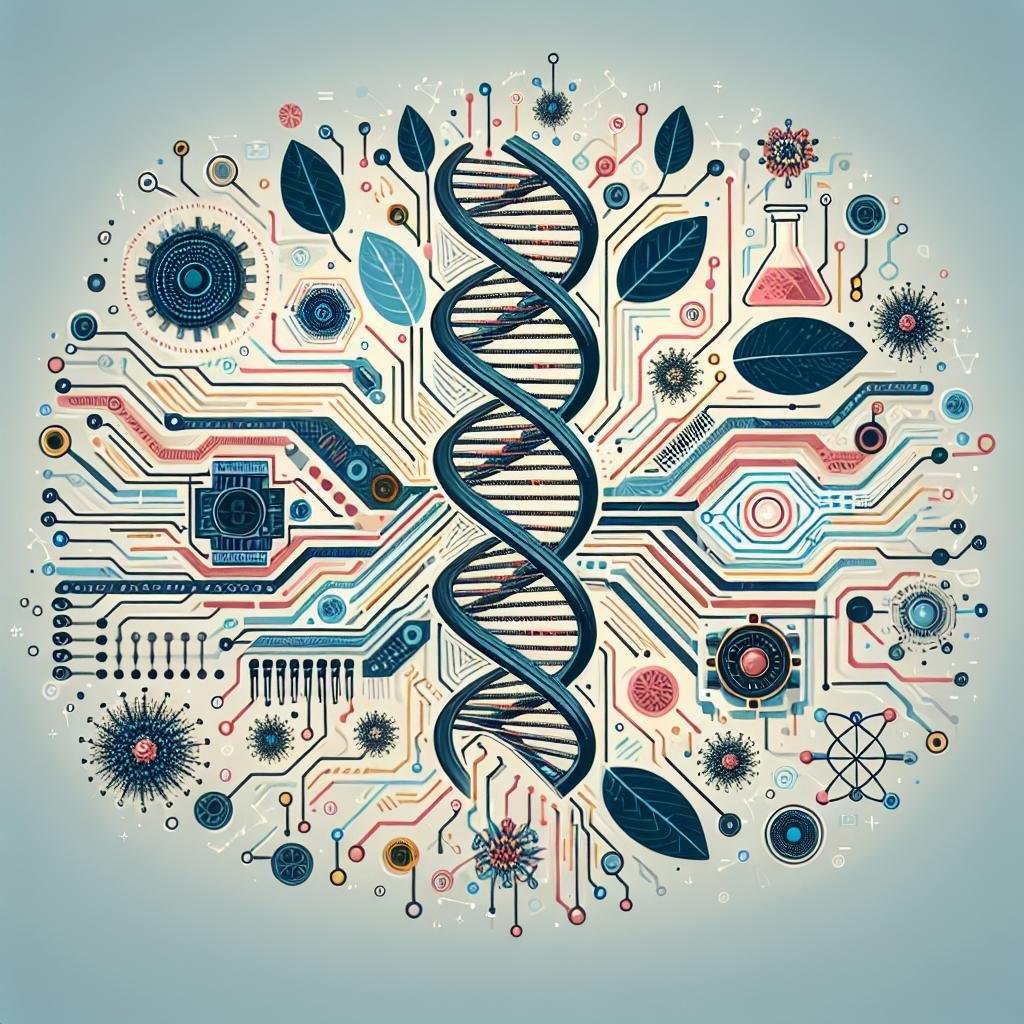In an era where technology reshapes our understanding of health and well-being, the concept of personalized medicine stands at the forefront of medical innovation. As we venture deeper into the digital age, the convergence of advanced analytics, artificial intelligence, and genomics is not just enhancing treatment options but also shifting the paradigms of how we conceive healthcare itself. This article explores the intricate dance between personalized medicine and emerging tech trends, revealing how tailored approaches are not merely a novelty but a necessity in the quest for more effective and efficient healthcare solutions. By dissecting the interplay of technology and medicine, we can uncover the promising potential of a future where treatments are uniquely crafted to align with the diverse genetic, environmental, and lifestyle factors of each individual. Join us as we navigate this transformative landscape, highlighting the innovations that are paving the way for a new standard of care.
Exploring the Intersection of Genes and Technology
As advancements in technology continue to reshape the landscape of healthcare, the concept of personalized medicine is gaining prominence. By harnessing the power of genetic information, healthcare providers can now tailor treatments to fit the unique genetic makeup of each patient. This bespoke approach not only enhances therapeutic effectiveness but also minimizes adverse side effects, creating a more efficient and patient-centered healthcare model. Key technologies contributing to this evolution include:
- Genomic Sequencing: Rapid and cost-effective sequencing allows for deeper insights into individual genetic variations.
- Data Analytics: Sophisticated algorithms enable the processing of vast amounts of genetic data to identify patterns and predict responses to treatment.
- Artificial Intelligence: Machine learning tools assist in synthesizing research findings, leading to more informed clinical decisions.
The integration of these technologies within the healthcare framework is paving the way for innovative solutions that redefine patient care. One illustrative example is the development of targeted therapies for conditions such as cancer, where treatments are specifically engineered to combat the unique characteristics of a patient’s tumors. To showcase some of the impact of personalized medicine, the following table highlights a comparison between traditional treatment methods and personalized approaches:
| Treatment Method | Effectiveness | Side Effects |
|---|---|---|
| Traditional Treatment | Standardized for all patients | Higher incidence of adverse reactions |
| Personalized Medicine | Tailored to genetic profile | Reduced risk of side effects |

AI-Driven Diagnostics: Revolutionizing Personalized Treatment
In the ever-evolving landscape of healthcare, AI-driven diagnostics are paving the way for transformative advancements in personalized treatment. Leveraging vast amounts of data, including genetic information and lifestyle factors, artificial intelligence can pinpoint disease markers with unprecedented accuracy. This capability allows practitioners to tailor interventions that address the unique needs of each patient, moving away from the one-size-fits-all approach that has long dominated medicine. Key benefits include:
- Increased Accuracy: AI algorithms can analyze complex datasets, improving diagnostic precision.
- Timely Interventions: Early detection through AI can significantly enhance treatment outcomes.
- Resource Optimization: AI reduces redundant tests and procedures, streamlining healthcare delivery.
The integration of AI into diagnostics not only enhances the efficiency of identifying health issues but also transforms how treatment plans are developed. By utilizing predictive analytics, healthcare providers can assess which therapies are most likely to succeed based on a patient’s specific genetic makeup and health history. This data-driven approach fosters a collaborative environment where patients are empowered to participate in their treatment decisions. A concise overview of this shift can be represented in the table below:
| Traditional Approach | AI-Driven Approach |
|---|---|
| Standardized treatment for all | Customized treatment plans |
| Delayed diagnoses | Real-time data analysis |
| Higher risk of adverse reactions | Minimized side effects through tailored therapies |

Wearable Tech and its Impact on Healthcare Customization
As technology continues to evolve, wearable devices are becoming integral to modern healthcare, allowing for real-time monitoring and data collection that powers personalized medicine. These gadgets can track a variety of health metrics, such as heart rate, blood pressure, and sleep patterns, enabling healthcare professionals to tailor treatments based on individual needs. Not only do wearables provide valuable insights, but they also facilitate early detection of potential health issues, leading to timely interventions. This shift from a one-size-fits-all approach to a more customized healthcare model is transforming patient experiences and outcomes.
Additionally, these innovations are not just about individual health but also pave the way for broader applications in clinical research and development. With the data harvested from wearables, researchers can:
- Identify health trends across diverse populations
- Assess the effectiveness of new therapies in real-time
- Enhance patient engagement in their own care
This seamless integration of technology into healthcare is creating a landscape rich with potential for improved health management and research efficiency. The implications are vast, as the collective data from wearables can significantly influence clinical guidelines and public health policies.

Ethical Considerations in the Era of Tailored Medicine
The rise of personalized medicine brings with it a multitude of ethical dilemmas that demand careful consideration. One of the foremost issues is data privacy, as the collection and analysis of genetic information necessitate the implementation of stringent safeguards to protect patient confidentiality. Patients must be made aware of how their data will be used and who will have access to it. The potential misuse of genetic data for discrimination, such as in insurance or employment, further complicates the landscape, creating a need for robust regulatory frameworks to ensure justice and equity in healthcare practices.
Additionally, the question of informed consent becomes increasingly pertinent. As treatments become more tailored to individual genetic makeups, what constitutes adequate information for patients to make decisions? It is critical to ensure that individuals not only understand the implications of their genetic tests and interventions but also grasp the potential risks and benefits involved. Moreover, the power dynamics in the physician-patient relationship might shift as medical knowledge becomes more specialized. Ensuring that patients feel empowered and supported in their healthcare decisions is essential in this evolving paradigm.
Q&A
Q&A: The Role of Personalized Medicine in Emerging Tech Trends
Q: What is personalized medicine, and how does it differ from traditional medicine?
A: Personalized medicine, often referred to as precision medicine, tailors medical treatment to the individual characteristics, needs, and preferences of a patient. Unlike traditional medicine, which typically adopts a one-size-fits-all approach, personalized medicine considers genetic, environmental, and lifestyle factors to optimize health outcomes. This individualization enables the selection of specific therapies based on a patient’s unique biological makeup.
Q: How are emerging technologies influencing personalized medicine?
A: Emerging technologies such as artificial intelligence (AI), big data analytics, and genomics are revolutionizing personalized medicine. AI algorithms can analyze vast amounts of genetic data to identify patterns and predict how patients will respond to treatments. Wearable technology monitors real-time health metrics, providing valuable insights into individual health profiles. This fusion of technology and medicine allows for more accurate diagnoses and customized treatment plans.
Q: What role does genomics play in personalized medicine?
A: Genomics, the study of an individual’s genes and their functions, serves as a cornerstone of personalized medicine. By sequencing a patient’s genome, healthcare providers can identify genetic predispositions to certain diseases and tailor prevention and treatment strategies accordingly. This level of understanding paves the way for targeted therapies, including biologics and gene therapies, which can improve efficacy while minimizing adverse effects.
Q: What challenges does personalized medicine face in the context of emerging technologies?
A: While the potential of personalized medicine is immense, several challenges persist. Data privacy concerns loom large, as sensitive genetic information must be protected against breaches. Additionally, the integration of diverse datasets—from genomics to patient lifestyles—requires robust interoperability standards. There’s also the need for healthcare professionals to be adequately trained in these advanced technologies to ensure they can interpret and implement personalized treatment plans effectively.
Q: How do patients perceive personalized medicine and its technological advancements?
A: Patients generally express enthusiasm for the prospects of personalized medicine, often recognizing its potential to revolutionize their care. Many appreciate the opportunity for tailored treatments that promise greater accuracy and effectiveness. However, there is also apprehension surrounding the implications of genetic testing and the uncertainty of results. To foster acceptance, healthcare providers must communicate transparently about the benefits, risks, and limitations of personalized approaches.
Q: What future trends can we expect to see in personalized medicine?
A: The future of personalized medicine is likely to witness increased integration of AI and machine learning for predictive analytics. We may also see advancements in gene editing technologies, such as CRISPR, allowing for precise modifications of genetic sequences. Furthermore, the rise of telemedicine will enhance accessibility to personalized care, enabling remote monitoring and consultations tailored to individual needs. As we embrace these trends, a more collaborative environment will evolve, combining healthcare professionals with tech innovators to enhance patient outcomes.
Q: Can you summarize the overall impact of personalized medicine on healthcare?
A: Personalized medicine, bolstered by emerging technologies, represents a paradigm shift in healthcare. By understanding and catering to the unique biology of each patient, the approach enhances preventive care, improves treatment efficacy, and promotes better health outcomes. While challenges remain, the potential for personalized medicine to innovate how we understand and approach health is vast, marking a progressive step towards a more holistic and effective healthcare system.
Concluding Remarks
As we stand at the intersection of personalized medicine and the rapid evolution of technology, it becomes increasingly clear that the future of healthcare is not just about treating diseases; it’s about understanding individuals. The integration of data analytics, artificial intelligence, and genetic profiling heralds a new era where therapies are tailored not only to the condition but to the unique characteristics of each patient.
As emerging tech trends continue to shape our world, we must remain mindful of the ethical implications and the need for equitable access to these groundbreaking advancements. Harnessing the power of personalized medicine, we are invited to imagine a landscape where healthcare is proactive, preventative, and intensely personal.
In the coming years, the synergy between personalized medicine and technology promises to redefine not just how we treat illness, but how we perceive wellness itself. As we continue to navigate these uncharted waters, one truth remains: the most innovative solutions will be those that prioritize the individual, creating a health ecosystem infused with empathy and understanding. The journey ahead is as exciting as it is complex, and it calls upon all of us—researchers, clinicians, policymakers, and patients—to collaborate and create a brighter, healthier future.

